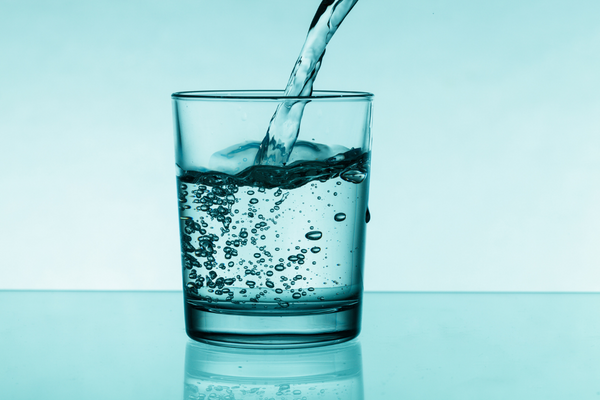
Which Is The Best Filter For Me In My Home?
When it comes to water filters, there are a lot of options on the market. How do you know which one is right for you? In this blog post, Oak Plumbing will discuss the different types of home filters and help you decide which one is best for your needs. We'll also provide some tips on how to maintain your home filter so that you can enjoy clean, filtered water for years to come!
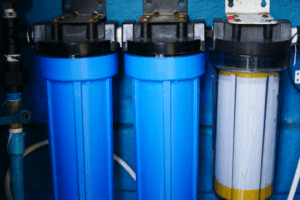
How water filters work
There are many different types of water filters, but they all work in essentially the same way. Water is forced through a filter, and impurities are trapped on the other side of the filter while clean water passes through.
The type of filter you need will depend on the quality of your water and what you want to remove from it. For example, if you're concerned about lead in your water, you'll need a filter that's specifically designed to remove lead.
Some filters are attached to your home's water supply so that all the water coming into your house is filtered. Other filters are portable and can be used to filter water from a specific faucet or even bottled water.
When choosing a filter, it's important to consider the cost of replacement filters as well as the initial cost of the unit. Some filters require frequent replacement, while others can last for years.
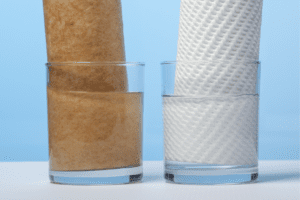
Types of water filters
There are a few different types of water filters that you can choose from. The most common type is the whole-house water filter. This type of filter is installed on your main water line, so it filters all of the water that comes into your home. If you're looking for a more comprehensive filtration system, a whole-house water filter is a great option.
Another type of water filter is the point-of-use (POU) filter. POU filters are typically installed under your kitchen sink or at your refrigerator. They filter water at the point where you'll use it, so you can be sure that the water you're drinking and cooking with is clean and fresh.
If you have specific concerns about the quality of your water, you may want to consider a reverse osmosis (RO) system. RO systems remove impurities from water by forcing it through a semipermeable membrane. This type of system is typically used in commercial settings, but it can also be installed in your home.
No matter which type of water filter you choose, be sure to change the filter regularly. This will ensure that your water stays clean and fresh-tasting.
If you're not sure which type of water filter is right for you, contact a plumbing professional. He or she can test your water and make recommendations based on your specific situation and needs.
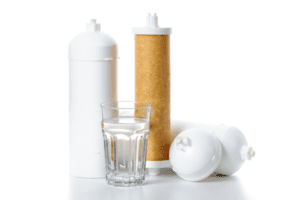
Mechanical water filter
A mechanical water filter is a device that uses physical means to remove impurities from water. Common types of mechanical filters include sediment filters and activated carbon filters.
Sediment filters are designed to remove large particles from water, such as dirt, sand, and rust. These filters are often used in conjunction with other types of filters, such as activated carbon filters, to provide comprehensive filtration.
Activated carbon filters are designed to remove smaller impurities from water, such as chlorine and lead. These filters work by adsorbing the impurities onto the surface of the activated carbon, which prevents them from passing through the filter.
If you're looking for a water filter for your home, it's important to consider the specific needs of your household. The type of water filter that's best for you will depend on the quality of your water supply and the level of filtration you require.
If you have a private well, it's important to have your water tested regularly to ensure that it meets your local health department's standards. If your water contains high levels of contaminants, you may need a more powerful water filter to remove them.
There are a variety of water filters on the market, so it's important to compare features and prices before making a purchase. Be sure to read the product labels carefully to ensure that you're getting a filter that meets your needs.
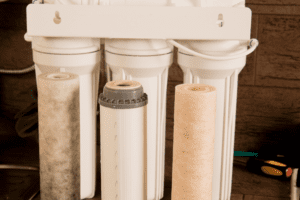
Absorption water filter
This type of filter uses a chemical process to remove contaminants from water. The most common type of absorption water filter is the activated carbon filter, which can remove chlorine, lead, and other contaminants from your water supply. Most domestic water filters use granular activated carbon (GAC) to reduce bad tastes and odors in the water. More expensive filters use carbon block elements to remove particles. These elements are categorized by micron rating standards measuring their performance.
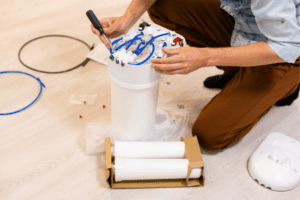
Sequestration water filter
Sequestration water filters use chemicals called sequestrants to bind metal and mineral ions in water. What this does is keep the particles suspended, which cuts down on cloudiness and staining in the water. Sequestrants don't actually remove contaminants from the water; they just keep them from settling.
Similarly, chelating agents are chemical compounds that bind tightly to metal ions. These compounds can form multiple bonds with a single metal ion. Chelating agents have medical uses in removing toxins from human bodies. Ethylenediamine is one example of a chelating agent.
Atoms have a nucleus with positive protons and neutral neutrons, with electrons orbiting the nucleus. If a metal atom loses its outermost electrons, it becomes a positively charged ion which is called a cation. Reducing the number of electrons orbiting the nucleus means that particles are strongly attracted to each other, reducing the size of metal ions.
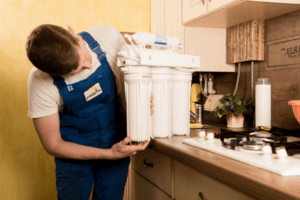
Ion exchange water filter
Ion exchange water filters soften hard water. This occurs when hard water flows through a resin bed. The positively charged magnesium and calcium ions in the water are attracted to the negative sites on the resin beads. These beads can hold onto only so many metal ions, so when the water contains more calcium and magnesium than the beads can accommodate, some of these metals are exchanged for sodium ions.
Despite the fact that the bond between magnesium, calcium, and resin is stronger than sodium's bond with the resin, time and saltiness will cause magnesium and calcium to empty into the discharge tube. Why is this important? Let's say you drink two gallons of water per day, and your water has an average hardness of 10 grains per gallon; this results in an intake of about 300mg of sodium daily. This problem might not be a big issue for you, but if you have high blood pressure or coronary artery disease, it's definitely something that you want to avoid.
Reverse Osmosis water filter
Reverse osmosis water filters use desalination to separate salt and other contaminants from seawater. The process is similar to the one that occurs in your kidneys, but on a much larger scale. The water is forced through a semi-permeable membrane, which only allows water molecules to pass through. A semi-permeable membrane is selective, allowing some molecules through while blocking others. Water flowing through the membrane to equalize concentration on both sides of the solution is called osmosis. When the water is forced to separate from particles, it is called reverse osmosis. The result is filtered water that's free of salt and other contaminants.
Reverse osmosis filters are typically used in industrial settings, but they can also be used in your home. If you live in an area with high concentrations of salt in the water, a reverse osmosis filter is a good option for you.
Combination water filter
Combination water filter systems use more than one type of filter. For example, a system might have a pre-filter to remove sediment and chlorine before the water enters the reverse osmosis filter. This distinction is crucial to understand when it comes to things like sequestration filters since sequestration filters separate water from contaminants but do not actually purify the water. To get the best results, you need to combine the sequestration filter with another type that will remove the separated particles from your water.
Benefits of water filters
No matter which type of home filter you use, water filters offer a wide range of benefits. Some of them may even surprise you! In brief, with a home filter, you get:
- Clean water
- Savings from not having to buy plastic bottles
- Relief from skin conditions
- Eliminated hard water
- Reduced plumbing costs
- Improved taste
- Eliminated contaminant deposits
- Eliminated soap scum
- Protection against water contamination
Can't decide which filter is best for you? Contact Oak Plumbing today!
We established Oak Plumbing to bring masterful plumbing back into our community. Our highest values are providing sterling customer service and keeping your family safe. That is why we only employ licensed and background-checked experts. Between our professional employees and our commitment to our customers, there's a very good reason why most of our customers give us five-star reviews. Become one of them and come on down to Oak Plumbing now!

